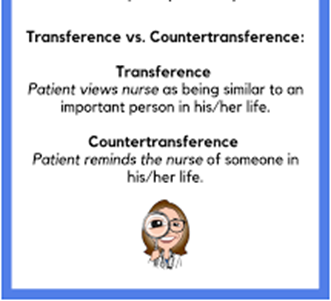The nurse who is caring for a client begins to have very protective feelings toward the client that are interfering with the therapeutic relationship between the nurse, the client, and the client's family. This is an example of a problem that is encountered in some therapeutic relationships and is known as:
Transference
An environmental problem
Resistance
Countertransference
The Correct Answer is D
Choice A rationale: Transference involves the client projecting feelings or attitudes onto the healthcare provider and can affect the therapeutic relationship.
Choice B rationale: Environmental problems are external issues arising from the individual’s physical and social setting such as interruptions and noise and can affect the therapeutic environment, not the nurse's emotional responses.
Choice C rationale: Resistance refers to the situation where the client consciously or unconsciously opposes or is reluctant to engage in therapeutic interventions and hinders treatment progress and outcomes.
Choice D rationale: Countertransference occurs when the healthcare provider projects their feelings and emotions, experiences, or unresolved issues onto the client. The nurse's overprotective feelings interfere with the objectivity and effectiveness of the therapeutic relationship.

Nursing Test Bank
Naxlex Comprehensive Predictor Exams
Related Questions
Correct Answer is B
Explanation
Choice A rationale: this is inaccurate since it does not display insecurity where feelings of inadequacy or uncertainty are displayed affecting the individual’s self-esteem and confidence.
Choice B rationale: transference is a defense mechanism where the patient unconsciously transfers their feelings, expectations, and attitudes from their previous relationship to a current relationship. In this case, the client is projecting her unresolved feelings about someone who did not care for her onto the nurse, who is trying to help her.
Choice C rationale: Countertransference is the process where the nurse unconsciously transfers their unresolved feelings and attitudes from a past relationship to their clients.
Choice D rationale: secondary gain is the benefit received by an individual for being sick, for instance, attention and sympathy. The client’s statement is an indication of rejection of the nurse’s help rather than seeking a secondary gain.

Correct Answer is C
Explanation
Choice A rationale: Excessive noise does impact the professional environment, but the primary concern is its potential impact on clients rather than the appearance of the mental health unit.
Choice B rationale: Excessive noise is more likely to disturb clients by causing insomnia and irritability rather than promoting relaxation.
Choice C rationale: Excessive noise in a mental health unit can disrupt the therapeutic environment and interfere with clients' thinking processes and perceptions by triggering anxiety, aggression, and anxiety. Therefore, maintaining a calm and quiet atmosphere supports mental health treatment.
Choice D rationale: There is no indication that excessive client noise is encouraged by the staff. However, the main concern is the impact of the staff noise on clients.
Whether you are a student looking to ace your exams or a practicing nurse seeking to enhance your expertise , our nursing education contents will empower you with the confidence and competence to make a difference in the lives of patients and become a respected leader in the healthcare field.
Visit Naxlex, invest in your future and unlock endless possibilities with our unparalleled nursing education contents today
Report Wrong Answer on the Current Question
Do you disagree with the answer? If yes, what is your expected answer? Explain.
Kindly be descriptive with the issue you are facing.
